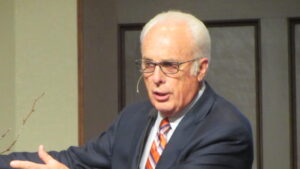Last year, I dedicated the summer to growth. I created a plan to ensure my children would grow spiritually, physically, and academically. I prepared workbooks and drafted key metrics, but ultimately, I failed.
This summer, I’m prioritizing silliness over seriousness. No more reading charts. No more daily checklists. I will still pursue growth, but no more measuring progress. This summer, I want to be more of a dad than a dictator.
My inner skeptic questions it. Perhaps yours does too. If you’re the kind of person who reads articles on Christian websites, you’re likely ambitious in helping your kids improve. That’s good! And it’s also good to chill. There is an intrinsic goodness in silliness when it comes to parenting. Of course, there’s an extreme in being too silly. But if you’re like me, there’s a greater risk of devaluing summer fun. So, let’s work on this together.
Children Are Fully Human
It’s not that one day children will become human when they are productive adults, but rather, they are fully human now. This doesn’t mean they are free of sin. Jesus is clear—children are not innocent (“No one is good except God alone,” Mark 10:18). But we should imitate Jesus’ countercultural approach in accepting the little ones as they are.
“Let the children come to me; do not hinder them.” – Jesus in Mark 10:14
There is a way to treat your kids more like projects than people. With projects, you don’t listen to their oddities, engage in their imaginations, or laugh at their otherwise unimpressive jokes. As projects, our kids are hindered from being the best at what they are—both child and human—and when that happens, they are exasperated (cf. Eph. 6:4).
Made in the Image of the Comedic Creator
Biblically, there is a lot to be said about the value of fun, joy, and play. Scripture is filled with laughter. I love the twists in Esther, the wordplay in Jonah, and the slapstick humour in the Gospels. Reading Scripture doesn’t just make me smile—it makes me smirk. Our parenting should reflect this.
The psalmist says of God, “In your presence there is fullness of joy” (Psalm 16:11). As we reflect our Father as dads (and as moms), can our kids say there is fullness of joy? I’m not saying they never get disciplined. I’m saying they should smile when they think of spending time with you. Do they do that?
I wish a scholar would write a biblical theology of fun, unpacking the joyful design of our comedic Creator: the trees that were pleasing to the eye, the feasts of Israel, and the joy of the hidden jewels—the Kingdom of heaven.
Silliness is how a child relates to beauty. Yes, children enjoy God’s creation differently than adults, and that can be encouraged! I don’t have a chapter and verse to defend my kids’ bathroom jokes, but I do wonder why, in God’s providence, he made potty humour so smile-inducing.
There are limits. We tell our kids to keep bathroom words in the bathroom. They take this seriously. And so they will call me out whenever I say “but” in a sentence. So I’ll say “but” again, and then we’ll all laugh.
When I started drafting this article, I thought I’d include a section on empirical research and what it reveals about the value of wrestling with your kids, making dad jokes, and laughing as a family. I have no doubt that such evidence exists. But sharing it would miss the point. I pity the parent who needs to read a peer-reviewed journal article before giggling with their kids. Why is it so hard to let kids be kids?
Our All-Too-Serious Society
Culturally, there are many factors pushing against appropriately silly parenting. As Mary Midgley observed, ever since the 17th century, we think of ourselves as being like machines. And when you think of your kids as computers, you’ll think of upgrades and achievements rather than personhood and character. To be sure, our kids should grow to be more like Christ—that is a kind of “upgrade”—but we mustn’t forget how the hidden Kingdom belongs to them, right now.
Freya India recently argued, “Nobody has a personality anymore.” She noticed how today’s therapeutic approach turns every eccentricity into a problem to be solved. She’s worth quoting in full:
We have lost the sentimental ways we used to describe people. Now you are always late to things not because you are lovably forgetful, not because you are scattered and interesting and secretly loved for never arriving on time, but because of ADHD… You are the way you are not because you have a soul but because of your symptoms and diagnoses… Every heartfelt, annoying, interesting piece of you, categorised. The fond ways your family describe you, medicalised. The pieces of us once written into wedding vows, read out in eulogies, remembered with a smile, now live on doctors’ notes and mental health assessments and BetterHelp applications.
We have taken the joy out of life by crunching it into machine-like parts for the sake of statistics. Parenting becomes tinkering—looking for the next area to optimize through technique or therapy rather than peace-filled presence.
When you’re silly with your kids, you destroy the modern-machine mindset and replace it with luxurious grace: we are images of God in the Kingdom of God.
Appropriate Silliness
Appropriate silliness doesn’t look like sarcasm—at least most of the time. Taking advantage of a child’s gullibility is more like making fun of them than sharing joy with them. It also doesn’t look like chaos. Biblical parenting recognizes true freedom as a bounded freedom; just as a fish is truly free when contained in water, we are most free when we abide in Christ and stay within his moral framework for our lives.
For me, I plan to dance. Ridiculous dances inspired by Bluey. Unnecessarily upbeat songs. I plan to throw a bouncy ball at the perfect speed and angle so that it’ll bounce back and hit me in the face. I plan on following my kids’ imaginations, making up new stories and adventures. Maybe as we weed the garden together, the weeds will become evil creatures. Maybe the unwatered tomato plant can become a desolate voyager, crying in thirst. Maybe the watering bucket can be poured out on me.
We don’t need a vacation or a new remote-controlled car. And we definitely don’t need more screen time. Just the joy of the Lord—and a whole lot of giggles.
























